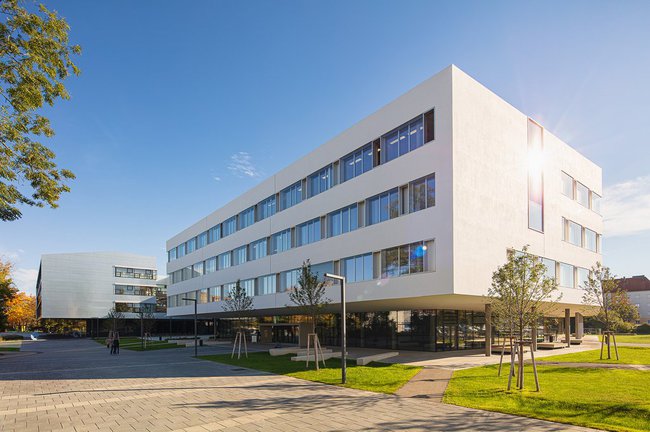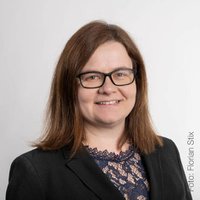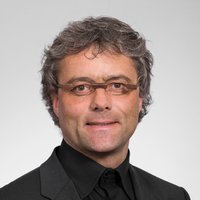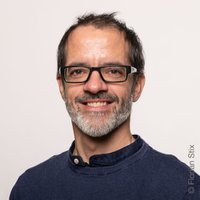Young Research at the St. Pölten UAS
Dissertation Projects at the St. Pölten University of Applied Sciences

Young researchers at the St. Pölten UAS are currently working on a number of dissertation projects. The topics range from machine learning and imaging in agriculture, 3D gait analysis, vocational assistance for youths, and social pedagogy to nursing science and digital support for healthcare teams.
Time and again, scientists and lecturers at the St. Pölten UAS write their dissertations in the course of their research projects or accompanying them. Currently, 32 employees of the St. Pölten UAS are writing their dissertations, 19 of which are created in close cooperation with research projects at the St. Pölten UAS and are supported by the latter. Six of these projects are also funded by the Gesellschaft für Forschungsförderung Lower Austria (GFF):
- Mark Simonlehner from the Institute of Health Sciences is working on aspects of patient-specific 3D gait analysis.
- Lucas Schöffer from the Institute of Creative\Media/Technologies is investigating how computers can respond to human cognitive states and how digital immersive applications (e.g., virtual reality) can thus adapt to their users.
- Eric Stumpe from the Institute of Creative\Media/Technologies analyses machine learning methods for imaging technologies in automated monitoring methods in agriculture.
- Patricia Renner from the Ilse Arlt Institute for Social Inclusion Research researches the perspective of users regarding offers of youth vocational assistance in Lower Austria.
- Manuel Schwanda of the Institute of Health Sciences and Deputy Academic Director for the study programme Healthcare and Nursing is studying nursing science research on unplanned, perioperative hypothermia.
- Anita Kidritsch of the Institute of Health Sciences explores the education of healthcare teams through digitally-enabled interprofessional collaboration.
“Science and research are not only an important basis for solving current social, ecological, and economic challenges, but also ensure the quality of our teaching in the medium and long term. The fact that our young researchers have been awarded grants for their dissertation projects is not only proof of the excellent work in our research institutes, but also of the high level of talent, motivation, and commitment of our researchers”, says UAS Executive Director Hannes Raffaseder.
Good Framework Conditions for Dissertations
An independent right to award doctorates is a long-standing demand of the Austrian UAS sector, which is already the case in many European countries and is considered to be a clear competitive advantage for their locations. Since Austria is currently not keeping up with current European developments, the St. Pölten UAS must strive all the more to provide the best possible framework conditions for its researchers at all stages of their academic careers. The support of dissertations in cooperation with universities in Austria and abroad is a very important aspect.
In addition, the cooperative doctoral programme “Visual Analytics and Computer Vision Meet Cultural Heritage” (VaCoViCu), which is funded by the Austrian Science Fund FWF and implemented by the St. Pölten UAS together with TU Wien, will start in autumn of 2023. The programme is dedicated to the preservation of cultural heritage through digital technologies. Historical photographs and amateur films are digitised and analysed.
In the future, doctoral programmes are also planned within the framework of the European University E³UDRES², which is managed by the St. Pölten University of Applied Sciences, and in which the nine participating universities from all over Europe will cooperate intensively.
Research at the St. Pölten UAS
Research has a high priority at the St. Pölten UAS. Scientists conduct research in six institutes and several centres. Interdisciplinary research is of particular importance – the departments are increasingly interconnected and the expertise of the individual institutes is combined.
More than 100 scientific employees and UAS professors carry out projects on application-oriented issues together with national and international partners from business and science, covering the entire innovation chain from basic research, technology development, and prototyping to innovation transfer in the form of business cooperations, spin-offs, and start-ups.
Further information

Mag. Gabriele Permoser
Head ofCenter for Research and Cooperation Head of Service Unit
Research and Knowledge Transfer Center for Research and Cooperation

FH-Prof. Dipl.-Ing. Hannes Raffaseder
Chief Executive Officer (CEO)
Mag. Mark Hammer
Section Head PressMarketing and Communications